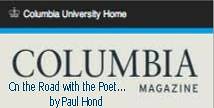“The Art of Being Richard Rodriguez”
 [Author’s Note]
[Author’s Note]
“The Art of Being Richard Rodriguez” originally appeared in The Bilingual Review/La Revista Bilingüe* in 2003. The essay was expanded from an interview/book review of Hunger of Memory: The Education of Richard Rodriguez written for The Village Voice and published as “Richard Rodriguez Interviews Himself” (April 27, 1982 : 45-47). I was motivated to write the essay because in the almost two decades after the publication of Hunger of Memory, Rodriguez had published two other books in which he as narrator morphs in synch the more popular media issues in the nation’s evolving culture–such as his quietly revealing, because it had become permissible, that he was gay. This suddenly made him “left of center,” when in Hunger he had concealed his sexual orientation (“Mr. Secrets”) and his career had been catapulted by conservative support because he lectured and wrote of being opposed to affirmative action and minority entitlements. Frankly, neither his sexuality nor his conservatism motivated my writing this piece. Hunger seemed inauthentic, an invention of a persona in search of a book market, and I was drawn to the creative nonfiction of his cameleon changes: in his next two books, like a Jorge Luis Borges character, he reinvented himself in language, tacitly rewriting the previous books without addressing the change or the contradictions, or even the books.
from ” The Art of Being Richard Rodriguez”:
“Ironically, this questionable use of language is also foreshadowed in his prologue’s declaration that his book was ‘about language.’ English, he wrote, ‘determined my public identity.’ Public, we had to figure out for ourselves, was his private usage to avoid the Chicano-aggressive ‘Anglo,’ a semantic connection made explicit somewhere else, once parenthetically inserted, ‘public (gringo).’ But what was ‘determined’ intended to mean? Surely English informed his identity, but did English decide it? We eventually discovered a sustained implication of a helpless linguistic and cultural change imposed on him even though a parallel thematic thread took pride in its being his choice. ”
from ” The Art of Being Richard Rodriguez”:
“Like Disney’s Ariel, the Mermaid, many of us start out believing we were born into the wrong world and grow up aspirants, studying the humans. That anxiousness, whether active or dormant, abides in every U.S. minority consciousness, driving it until it is driven out. In adolescence, we have all stared into the mirror at damning complexions, sometimes not even ours but of socially marginalized faces with whom we are linked, and wanted to crawl out of our names or skins. What cultural wealth we possess may wait for us forever smothered under the sloppy seaweed of our generic minority story. Social mobility vindicates individually but does not redeem from that story. Seeking redemption in his ‘public’ identity, Rodriguez embraced the overcorrectness of an American pre-sixties, the conservatism he espoused against the cultural politics and educational policies he encountered both as student and teacher in the seventies.”
For the complete essay in PDF format click 
*Copyright of The Bilingual Review is a property of The Bilingual Review. The copyright of an individual article may be maintained by author in certain cases. Content may not be copied or e-mailed to multiple sites or posted to a listserv without the copyright holder’s expressed written permission. However users may print, download, or e-mail articles for individual use.

